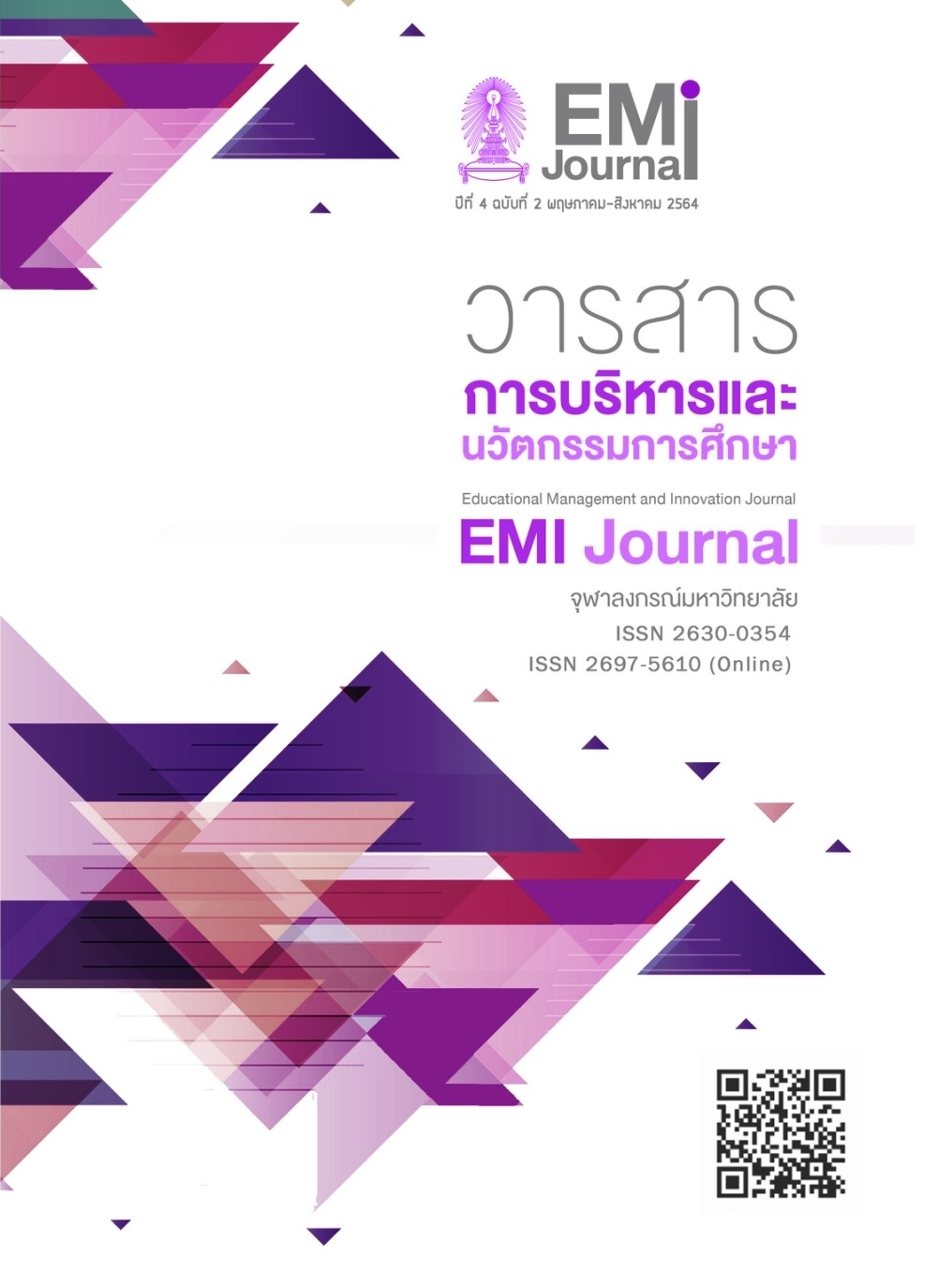บทเรียนสะท้อนคิดเพื่อสร้างค่านิยมหลักขององค์กรในโรงเรียนนำร่องในพื้นที่ นวัตกรรมการศึกษา : กรณีศึกษาบริษัทเอกชนคัดสรร
บทเรียนสะท้อนคิดเพื่อสร้างค่านิยมหลักขององค์กรในโรงเรียนนำร่องในพื้นที่ นวัตกรรมการศึกษา : กรณีศึกษาบริษัทเอกชนคัดสรร
คำสำคัญ:
ค่านิยมหลักขององค์กร, โรงเรียนนำร่องในพื้นที่นวัตกรรมการศึกษา, บริษัทเอกชนคัดสรรบทคัดย่อ
เพื่อความอยู่รอดในโลกยุคสังคมพลิกผัน โรงเรียนควรจัดการศึกษาให้สอดคล้องกับบริบทและความต้องการของชุมชน สามารถสร้างและพัฒนานวัตกรรมเพื่อใช้พัฒนาคุณภาพการศึกษา บทความนี้มุ่งนำเสนอการสะท้อนคิดเกี่ยวกับค่านิยมหลักของบริษัทเอกชนคัดสรรสู่การเรียนรู้เพื่อส่งเสริมค่านิยมหลักของโรงเรียนนำร่องในพื้นที่นวัตกรรมการศึกษา ประเทศไทยมีโรงเรียนนำร่องในพื้นที่นวัตกรรมการศึกษารวม 413 แห่ง ผู้เขียนได้คัดสรรบริษัทเอกชน 3 แห่งที่มีความเป็นเลิศด้านการจัดการนวัตกรรมและมีค่านิยมหลักขององค์กร ได้แก่ บริษัท พีทีจี เอ็นเนอยี จำกัด (มหาชน) หรือ PTG บริษัท ทรู คอร์ปอเรชั่น จำกัด (มหาชน) และบริษัท ยูบิส (เอเชีย) จำกัด (มหาชน) หรือ UBIS ผลการศึกษาพบว่า ค่านิยมหลักของบริษัทเอกชนคัดสรรสามารถนำมาเป็นแนวทางในการสร้างค่านิยมหลักของโรงเรียนนำร่องในพื้นที่นวัตกรรมการศึกษาได้ 6 ประการ ประกอบด้วย 1) การนำองค์กรอย่างมีวิสัยทัศน์ 2) มีความเป็นเลิศที่มุ่งเน้นลูกค้า 3) การให้ความสำคัญกับบุคลากร 4) การเรียนรู้ระดับองค์กรและความคล่องตัว 5) การจัดการเพื่อสร้างนวัตกรรม และ 6) การทำประโยชน์ให้สังคม
Downloads
เอกสารอ้างอิง
Adams, R., Bessant, J., & Phelps, R. (2006). Innovation Management Measurement:
A Review. International Journal of Management Review, 21-47.
Armandi, B., Oppedisano, J., & Sherman, H. (2003). Leadership Theory and Practice:
A Case in Point. Management Decision, 41(10), 1076-1088.
Bureau of Education Innovation Development. (2020). 273 Pilot Schools in 8 Provinces
towards Challenging of the Education Sandbox. [Online]. Retrieved from https://www.edusandbox.com/, Accessed on September 1, 2020. [in Thai]
Caldwell, D. F., & O’Reilly C. A. (2003). The Determinants of Team-Based Innovation in Organizations: The Role of Social Influence. Small Group Research, 34(4), 497-517.
Dunegan, K., Tierney, P., & Duchon, D. (1992). Toward an Understanding of Innovation
Climate: Explaining Variance in Perceptions by Divisional Affiliation, Work Group
Interactions, and Subordinate-Manager Exchanges. IEEE Transactions on Engineering Management, (Special Issue 39), 227-236.
Education Sandbox B.E. (2019, 30 April). Royal Thai Government Gazette. vol. 136 parts 56 A., 102-120. [in Thai]
Glaeser, W. (2019). Leadership Skills & Strategies VUCA World. [Online]. Retrieved from
https://www.vuca-world.org/, Accessed on September 1, 2020.
Lertgrai, P. (2019). Innovation Management for Organization Development. Journal of MCU Nakhondhat, 6(8), 3745-3757. [in Thai]
Morakote, N. (2016). Organizational Value. News - Faculty of Medicine Chiang Mai University, 31(1), 8-10. [in Thai]
Nanus, B. (1992). Visionary Leadership: Creating a Compelling Sense of Direction for your Organization. Journal Articles, (San Francisco: Jossey Bass Publisher, 1992), 119.
National Innovation Agency. (2006). Innovative Dynamic. Bangkok: National Innovation Agency, Ministry of Science and Technology. [in Thai]
National Innovation Agency. (2018). Top 5 Best Organizations Driven by Innovation (In
Thailand). [Online]. Retrieved from http://www.nia.or.th/5ID/, Accessed on September 5, 2020. [in Thai]
Office of Thailand Quality Award. (2019). TQA Criteria for Performance Excellence Framework 2020-2021. Bangkok: Eastern Printing Public Company Limited. [in Thai]
Office of Thailand Quality Award. (2020). Thailand Quality Award 2019. [Online]. Retrieved from http://www.https://www.tqa.or.th/th/tqa-winners/, Accessed on September 5, 2020. [in Thai]
Office of the Education Council. (2016). Obligation Excellence Collaboration Way. Bangkok: Prik Wan Graphic Company Limited. [in Thai]
Pundt, A. M., & Nerdinger, E. (2010). Innovative Behavior and the Reciprocal Exchange
between Employees and Organizations. German Journal of Research in Human
Resource Management, 24(2), 173-193.
Rangkasiri, T. (2014). Marketing Thought: Management Model for “Students-as-Customers” Metaphor in Thailand. Chulalongkorn Business Review, 36(3), 18-35. [in Thai]
Sanguanwongwan, V. (2011). Management and Organizational Behavior. Bangkok: Pierson. [in Thai]
Senge, P. M. (1990). The Fifth Discipline: The Art and Practice of the Learning Organization. New York: Doubleday.
Sopa, S. (2017). School Administration toward the Excellent School of middle School under The Secondary Educational Service Area Office 25: The Case Study of Waengyaiwittayakhom School. College of Asian Scholar Journal, 7(2), 84-94. [in Thai]
Thaipat Institute. (2010). What is CSR?. [Online]. Retrieved from http://www.thaicsr.com /2006/03/blog-post_20.html, Accessed on September 2, 2020. [in Thai]
True Corporation Public Company Limited. (2019). Sustainability Report 2019. Bangkok: True Corporation Public Company Limited. [in Thai]
Upper Secondary Education Bureau, Office of the Basic Education Commission. (2013). Quality Management System Guidelines for TQA. Bangkok: The Agricultural Cooperative Federation of Thailand Limited. [in Thai]
Vagadia, B. (2020). Digital Disruption. Switzerland: Springer International Publishing.
Wiles, J. (2009). Leading Curriculum Development. California: Sage Company.



